Unit 2 What time do you go to school? (Section B 2a-self check)课件+嵌入音频(共27张PPT)
文档属性
| 名称 | Unit 2 What time do you go to school? (Section B 2a-self check)课件+嵌入音频(共27张PPT) |
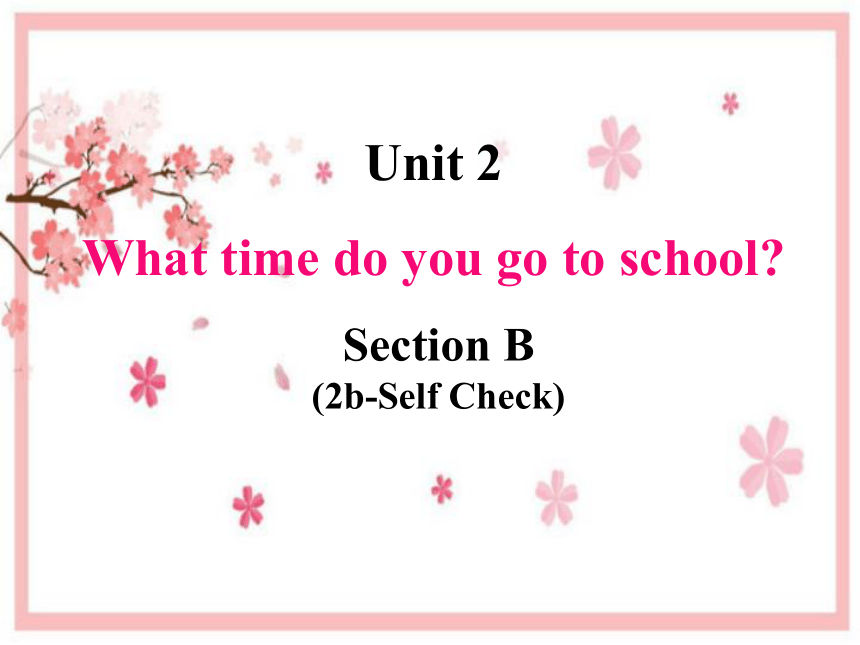
|
|
| 格式 | pptx | ||
| 文件大小 | 3.1MB | ||
| 资源类型 | 教案 | ||
| 版本资源 | 人教新目标(Go for it)版 | ||
| 科目 | 英语 | ||
| 更新时间 | 2022-04-27 08:17:20 | ||
图片预览

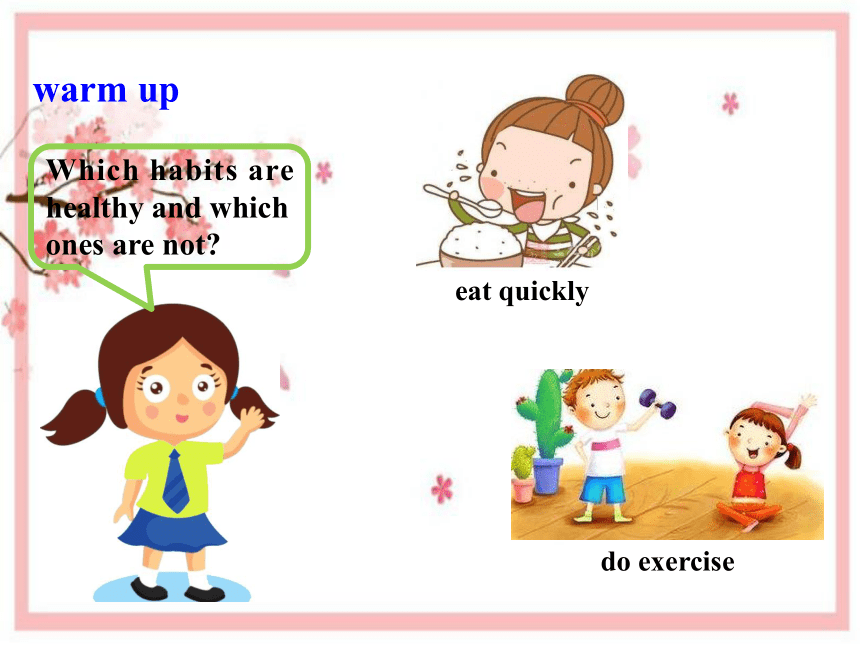
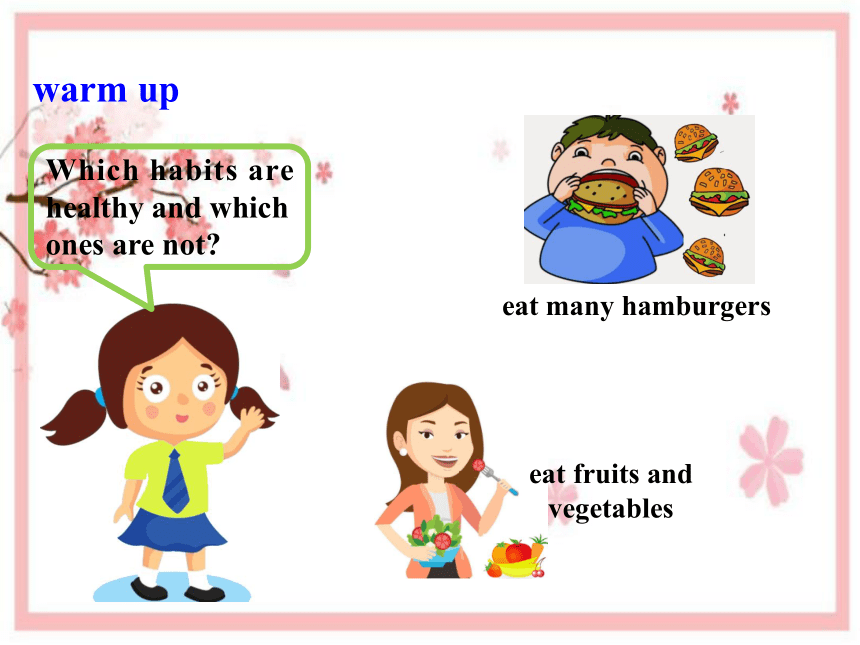
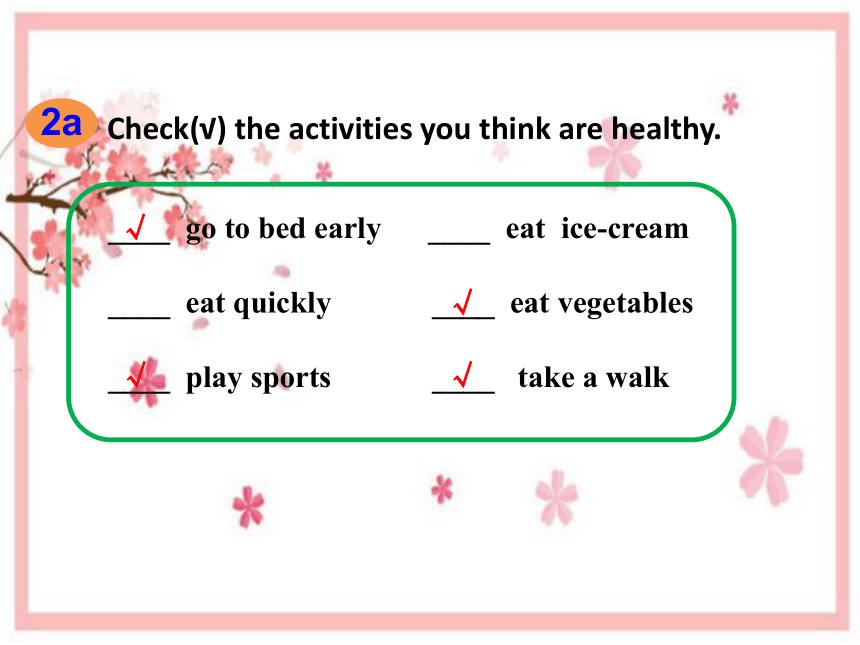
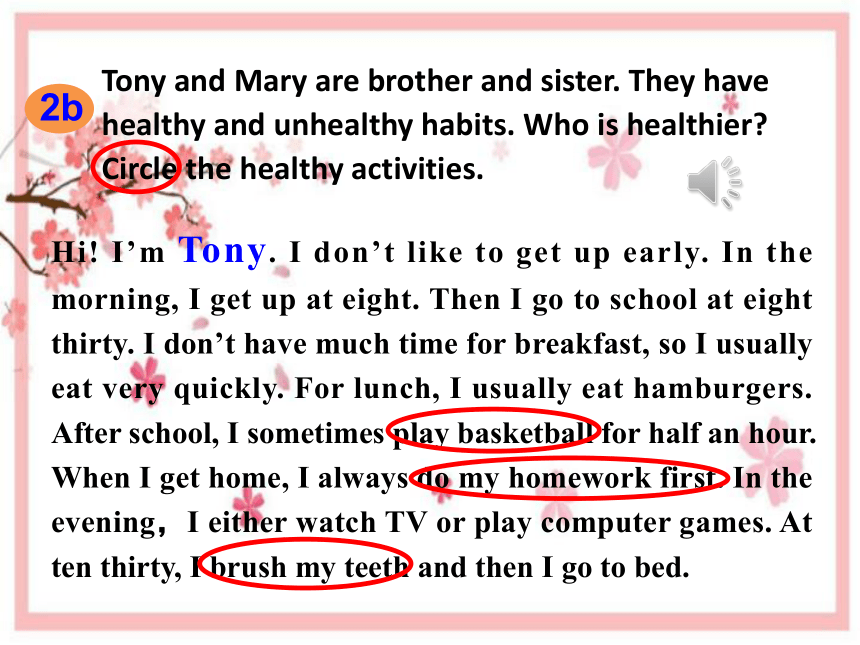
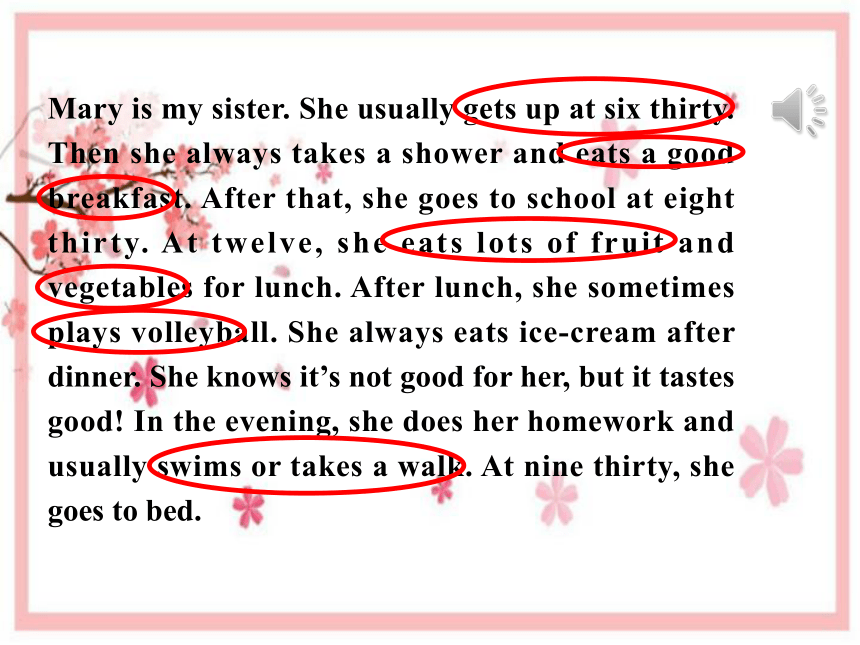
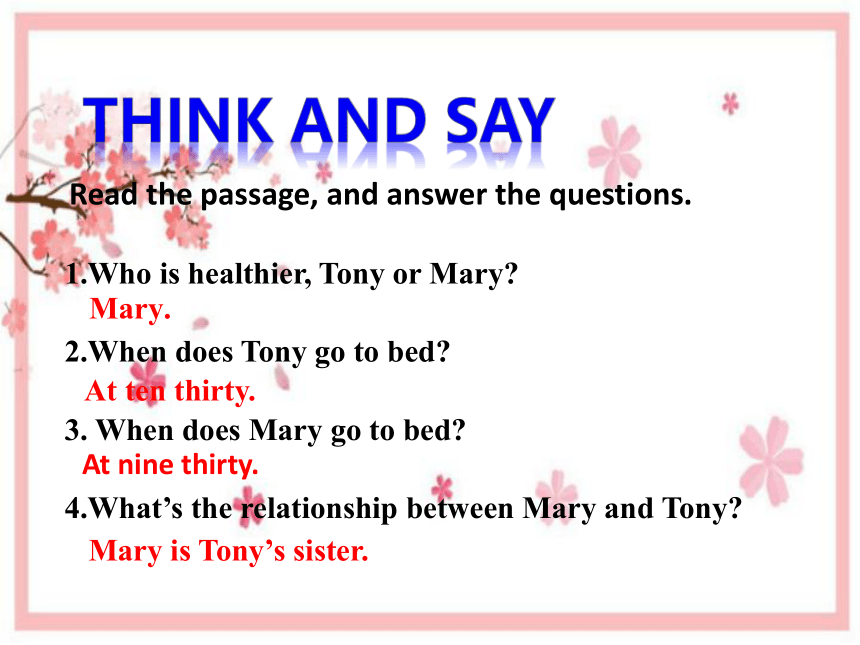
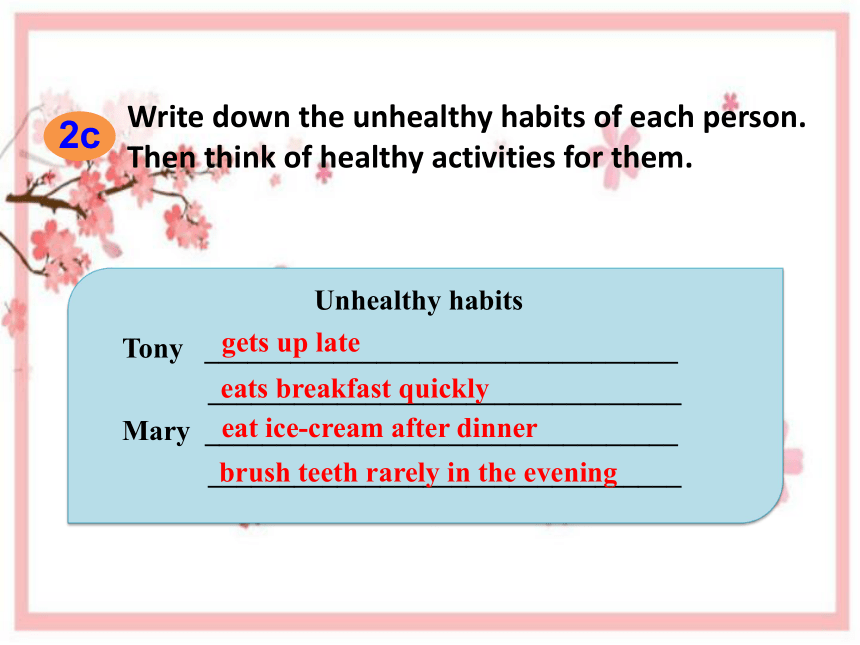
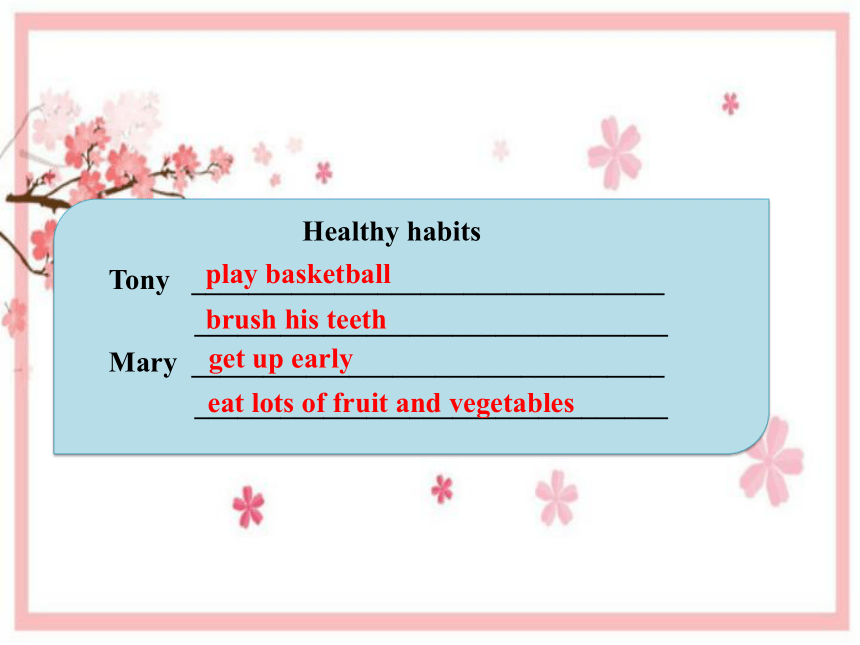
文档简介
(共27张PPT)
Section B
(2b-Self Check)
Unit 2
What time do you go to school
warm up
Which habits are healthy and which ones are not
eat quickly
do exercise
warm up
Which habits are healthy and which ones are not
eat many hamburgers
eat fruits and vegetables
Check(√) the activities you think are healthy.
2a
____ go to bed early ____ eat ice-cream
____ eat quickly ____ eat vegetables
____ play sports ____ take a walk
√
√
√
√
Tony and Mary are brother and sister. They have healthy and unhealthy habits. Who is healthier Circle the healthy activities.
2b
Hi! I’m Tony. I don’t like to get up early. In the morning, I get up at eight. Then I go to school at eight thirty. I don’t have much time for breakfast, so I usually eat very quickly. For lunch, I usually eat hamburgers. After school, I sometimes play basketball for half an hour. When I get home, I always do my homework first. In the evening,I either watch TV or play computer games. At ten thirty, I brush my teeth and then I go to bed.
Mary is my sister. She usually gets up at six thirty. Then she always takes a shower and eats a good breakfast. After that, she goes to school at eight thirty. At twelve, she eats lots of fruit and vegetables for lunch. After lunch, she sometimes plays volleyball. She always eats ice-cream after dinner. She knows it’s not good for her, but it tastes good! In the evening, she does her homework and usually swims or takes a walk. At nine thirty, she goes to bed.
Read the passage, and answer the questions.
1.Who is healthier, Tony or Mary
2.When does Tony go to bed
3. When does Mary go to bed
4.What’s the relationship between Mary and Tony
Mary.
At ten thirty.
At nine thirty.
Mary is Tony’s sister.
think and say
Write down the unhealthy habits of each person. Then think of healthy activities for them.
2c
Tony _________________________________
_________________________________
Mary _________________________________
_________________________________
Unhealthy habits
gets up late
eats breakfast quickly
eat ice-cream after dinner
brush teeth rarely in the evening
Tony _________________________________
_________________________________
Mary _________________________________
_________________________________
Healthy habits
play basketball
brush his teeth
get up early
eat lots of fruit and vegetables
Number these sentences in order to make a story about a daily routine.
3a
___ I usually exercise from six fifteen to seven.
___ I always get up at six.
___ After that, I always brush my teeth and go to school at
eight.
___ Then I quickly have a shower and eat breakfast.
3
2
5
4
___ I have lunch at a quarter to twelve.
___ I get home from school at half past four and do my
homework.
___ I have a very healthy life.
___ I have dinner at seven thirty.
___ I go to bed at ten.
6
7
1
8
9
Write about your own daily routine.
3b
写作
模板
Language points
After school, I sometimes play basketball for half an hour.
放学后我有时打半个小时篮球。
1
【解析】
sometimes 副词,意为“有时”。
I sometimes play football with my brother.
我有时和我哥哥踢足球。
名词短语,“一段时间”
some time
副词,“某个 时间”
sometimes some times sometime some time
sometimes
some times
sometime
频度副词,“有时”
名词短语,“几次,几倍”
【辨析】
In the evening, I either watch TV or play computer games.
晚上,我要么看电视,要么玩电脑游戏。
2
【解析】
either...or... 意为“要么……要么……;或者……或者……”,用来连接两个并列的单词、短语或句子。其中either是连词,意为“或者”。
You can eat either apples or oranges.
你可以吃苹果或者橙子。
I either watch TV or do my homework on weekends.
我周末要么看电视,要么做家庭作业。
Either you leave now or I’ll call the police!
要么你现在就离开,要么我将打电话报警!
either...or... 连接两个名词或代词作主语时,谓语动词应与离它最近的主语在人称和数上保持一致,即遵循“就近一致”原则。
【注意】
Either you or I am going there tomorrow.
明天要么你去那里,要么我去那里。
3
At twelve, she eats lots of fruit and vegetables for lunch.
在12点,她午餐吃许多水果和蔬菜。
【解析】
lots of 意为“大量;许多”,相当于a lot of。
There are lots of/a lot of new words in Book 3.
第3册书中有许多新单词。
【联想】
lots of/a lot of+ 可数名词复数/不可数名词
much+不可数名词
many+可数名词复数
许多
【辨析】
lots of/a lot of, a lot
She knows it’s not good for her, but it tastes good!
她知道那对她不好,但它尝起来很好!
4
【解析】
be good for 意为“对……有好处”,其反义短语为be bad for“对……有害”。
Eating fruit is good for our health.
吃水果对我们的健康有益。
Watching too much TV is bad for your eyes.
看太多电视对你的眼睛有害。
Self check
Match the verbs in column A with the words in column
B. Then use the phrases to complete the sentences.
A taste clean have get take brush
your teeth my room a walk
good dressed a good job
B
1
1. Ice-cream usually _______________ so students like to
eat it after school.
2. My grandparents are very healthy. They always _____
___________ after dinner.
3. You need to _______________ after eating to have good
teeth.
4. He _______________. He works at a radio station.
brush your teeth
tastes good
a walk
take
has a good job
5. Here are your clothes. Go and _______________ quickly!
6. I don’t have time to _______________ from Monday to Friday. So I clean it on weekends.
get dressed
clean my room
Complete the conversations with questions and answers.
Use the words in the brackets to help you.
A.__________________________________________
(your mother/usually/get up)
B. __________________________________________.
(5:45)
A:__________________________________________
(why/get up/so early )
B:__________________________________________.
(always/make breakfast for me)
1.
What time does your mother usually get up
She usually gets up at 5:45 in the morning
Why does she get up so early
Because she always makes breakfast for me
2
A.__________________________________________
(you/usually/get to school)
B. __________________________________________.
(7:30)
A:_______________________________________________
(your class teacher/usually/get to school)
B: I don’t know. But he/she is never late for the first
class in the morning.
2.
What time do you usually get to school
I usually get to school at 7:30 in the morning
What time does your class teacher usually get to school
Language points
【解析】
Here are your clothes.
这是你的衣服。
这是一个全部倒装句。
副词 here或there 位于句首时,如果句子主语是名词(短语),句子要用全部倒装语序,即“Here/There+谓语+主语.”,且谓语动词的数要与主语的数保持一致。
【名师导学】
Here is your pen.
这是你的钢笔。
【注意】
若副词 here/there开头的句子中,主语是人称代词,句子不用倒装语序。
Here it comes.
它来了。
Exercise
1. _____ two tickets(票) for you.
A. There is B. Here is? C. Here are D. Are here
2. Doing exercise every day is good ______ your health.
A. for B. at C. with D. in
3. —_____ do you have art
—On Monday afternoon and Friday afternoon.
A. Where B. When C. How D. Where
C
A
B
4. He usually goes to school by bus, but ______ he goes to school on foot because he thinks walking is good for him.
A. some time B. usually? C. never D. sometimes
D
5. There are _____ cups on the table and there is _____ fruit juice in the cups.?
A. lots of;many? B. lots of;much?
C. many;many? D. much;lots of
B
Section B
(2b-Self Check)
Unit 2
What time do you go to school
warm up
Which habits are healthy and which ones are not
eat quickly
do exercise
warm up
Which habits are healthy and which ones are not
eat many hamburgers
eat fruits and vegetables
Check(√) the activities you think are healthy.
2a
____ go to bed early ____ eat ice-cream
____ eat quickly ____ eat vegetables
____ play sports ____ take a walk
√
√
√
√
Tony and Mary are brother and sister. They have healthy and unhealthy habits. Who is healthier Circle the healthy activities.
2b
Hi! I’m Tony. I don’t like to get up early. In the morning, I get up at eight. Then I go to school at eight thirty. I don’t have much time for breakfast, so I usually eat very quickly. For lunch, I usually eat hamburgers. After school, I sometimes play basketball for half an hour. When I get home, I always do my homework first. In the evening,I either watch TV or play computer games. At ten thirty, I brush my teeth and then I go to bed.
Mary is my sister. She usually gets up at six thirty. Then she always takes a shower and eats a good breakfast. After that, she goes to school at eight thirty. At twelve, she eats lots of fruit and vegetables for lunch. After lunch, she sometimes plays volleyball. She always eats ice-cream after dinner. She knows it’s not good for her, but it tastes good! In the evening, she does her homework and usually swims or takes a walk. At nine thirty, she goes to bed.
Read the passage, and answer the questions.
1.Who is healthier, Tony or Mary
2.When does Tony go to bed
3. When does Mary go to bed
4.What’s the relationship between Mary and Tony
Mary.
At ten thirty.
At nine thirty.
Mary is Tony’s sister.
think and say
Write down the unhealthy habits of each person. Then think of healthy activities for them.
2c
Tony _________________________________
_________________________________
Mary _________________________________
_________________________________
Unhealthy habits
gets up late
eats breakfast quickly
eat ice-cream after dinner
brush teeth rarely in the evening
Tony _________________________________
_________________________________
Mary _________________________________
_________________________________
Healthy habits
play basketball
brush his teeth
get up early
eat lots of fruit and vegetables
Number these sentences in order to make a story about a daily routine.
3a
___ I usually exercise from six fifteen to seven.
___ I always get up at six.
___ After that, I always brush my teeth and go to school at
eight.
___ Then I quickly have a shower and eat breakfast.
3
2
5
4
___ I have lunch at a quarter to twelve.
___ I get home from school at half past four and do my
homework.
___ I have a very healthy life.
___ I have dinner at seven thirty.
___ I go to bed at ten.
6
7
1
8
9
Write about your own daily routine.
3b
写作
模板
Language points
After school, I sometimes play basketball for half an hour.
放学后我有时打半个小时篮球。
1
【解析】
sometimes 副词,意为“有时”。
I sometimes play football with my brother.
我有时和我哥哥踢足球。
名词短语,“一段时间”
some time
副词,“某个 时间”
sometimes some times sometime some time
sometimes
some times
sometime
频度副词,“有时”
名词短语,“几次,几倍”
【辨析】
In the evening, I either watch TV or play computer games.
晚上,我要么看电视,要么玩电脑游戏。
2
【解析】
either...or... 意为“要么……要么……;或者……或者……”,用来连接两个并列的单词、短语或句子。其中either是连词,意为“或者”。
You can eat either apples or oranges.
你可以吃苹果或者橙子。
I either watch TV or do my homework on weekends.
我周末要么看电视,要么做家庭作业。
Either you leave now or I’ll call the police!
要么你现在就离开,要么我将打电话报警!
either...or... 连接两个名词或代词作主语时,谓语动词应与离它最近的主语在人称和数上保持一致,即遵循“就近一致”原则。
【注意】
Either you or I am going there tomorrow.
明天要么你去那里,要么我去那里。
3
At twelve, she eats lots of fruit and vegetables for lunch.
在12点,她午餐吃许多水果和蔬菜。
【解析】
lots of 意为“大量;许多”,相当于a lot of。
There are lots of/a lot of new words in Book 3.
第3册书中有许多新单词。
【联想】
lots of/a lot of+ 可数名词复数/不可数名词
much+不可数名词
many+可数名词复数
许多
【辨析】
lots of/a lot of, a lot
She knows it’s not good for her, but it tastes good!
她知道那对她不好,但它尝起来很好!
4
【解析】
be good for 意为“对……有好处”,其反义短语为be bad for“对……有害”。
Eating fruit is good for our health.
吃水果对我们的健康有益。
Watching too much TV is bad for your eyes.
看太多电视对你的眼睛有害。
Self check
Match the verbs in column A with the words in column
B. Then use the phrases to complete the sentences.
A taste clean have get take brush
your teeth my room a walk
good dressed a good job
B
1
1. Ice-cream usually _______________ so students like to
eat it after school.
2. My grandparents are very healthy. They always _____
___________ after dinner.
3. You need to _______________ after eating to have good
teeth.
4. He _______________. He works at a radio station.
brush your teeth
tastes good
a walk
take
has a good job
5. Here are your clothes. Go and _______________ quickly!
6. I don’t have time to _______________ from Monday to Friday. So I clean it on weekends.
get dressed
clean my room
Complete the conversations with questions and answers.
Use the words in the brackets to help you.
A.__________________________________________
(your mother/usually/get up)
B. __________________________________________.
(5:45)
A:__________________________________________
(why/get up/so early )
B:__________________________________________.
(always/make breakfast for me)
1.
What time does your mother usually get up
She usually gets up at 5:45 in the morning
Why does she get up so early
Because she always makes breakfast for me
2
A.__________________________________________
(you/usually/get to school)
B. __________________________________________.
(7:30)
A:_______________________________________________
(your class teacher/usually/get to school)
B: I don’t know. But he/she is never late for the first
class in the morning.
2.
What time do you usually get to school
I usually get to school at 7:30 in the morning
What time does your class teacher usually get to school
Language points
【解析】
Here are your clothes.
这是你的衣服。
这是一个全部倒装句。
副词 here或there 位于句首时,如果句子主语是名词(短语),句子要用全部倒装语序,即“Here/There+谓语+主语.”,且谓语动词的数要与主语的数保持一致。
【名师导学】
Here is your pen.
这是你的钢笔。
【注意】
若副词 here/there开头的句子中,主语是人称代词,句子不用倒装语序。
Here it comes.
它来了。
Exercise
1. _____ two tickets(票) for you.
A. There is B. Here is? C. Here are D. Are here
2. Doing exercise every day is good ______ your health.
A. for B. at C. with D. in
3. —_____ do you have art
—On Monday afternoon and Friday afternoon.
A. Where B. When C. How D. Where
C
A
B
4. He usually goes to school by bus, but ______ he goes to school on foot because he thinks walking is good for him.
A. some time B. usually? C. never D. sometimes
D
5. There are _____ cups on the table and there is _____ fruit juice in the cups.?
A. lots of;many? B. lots of;much?
C. many;many? D. much;lots of
B
同课章节目录
- Unit 1 Can you play the guitar?
- Section A
- Section B
- Unit 2 What time do you go to school?
- Section A
- Section B
- Unit 3 How do you get to school?
- Section A
- Section B
- Unit 4 Don't eat in class.
- Section A
- Section B
- Unit 5 Why do you like pandas?
- Section A
- Section B
- Unit 6 I'm watching TV.
- Section A
- Section B
- Review of Units 1-6
- Unit 7 It's raining!
- Section A
- Section B
- Unit 8 Is there a post office near here?
- Section A
- Section B
- Unit 9 What does he look like?
- Section A
- Section B
- Unit 10 I'd like some noodles.
- Section A
- Section B
- Unit 11 How was your school trip?
- Section A
- Section B
- Unit 12 What did you do last weekend?
- Section A
- Section B
